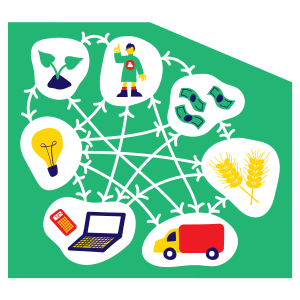Boosting the European culture of solidarity
23 Jul 2020
We spoke with Márton Szarvas from Szovetkezetiseget Tamogato Egyesulet about the initiative ‘Boosting the European culture of solidarity’ and how it will boost existing solidarity solutions into a broader sphere of cultural imagination in a time of crisis. The initiative connects cultural workers with new solidarity initiatives in Hungary and Europe by making solidarity solutions available to cultural work and boosting the communication and visibility of solidarity responses.
Márton Szarvas explains “Instead of anxiety and exclusion, of which Hungary has often been referred to as an example of, we build techniques, collaborations and a broader imagination towards the culture of solidarity. Our initiative has been operating for two years, and its initial goal was to connect cultural workers with new solidarity initiatives which are working according to principles of cooperation and sharing both resources and ownership.
However, it turned out that it’s quite a complicated process because neither the legal nor the financial situation in Hungary is suitable for that, so we established an association which maps these initiatives but also helps them to develop their organizational structure and financial situation.”

By building on the work of Solidarity Action Group, a group of 12 organizations active since March 2020, they proposed a collaboration between cultural workers and existing initiatives of solidarity solutions to problems raised by the crisis. This will make solidarity initiatives for housing, unions, care work and corporatization accessible for cultural workers, and engage cultural workers in the communication of existing solutions in Europe, and boost the culture of solidarity.
When it comes to the concrete plan of the project boosting the culture of solidarity, Márton describes the issues they will address and how they will do so.
“We currently have a lot of connections and want to make them more public and understandable. In these different fields, we will continue to map, connect and display existing Hungarian solidarity initiatives. We plan to have webinars with our Hungarian partners on solidarity initiatives in the crisis, long-term solidarity economy models, new possibilities for cultural work, a culture of solidarity. These are the four main topics for the Hungarian context. We will also organize two webinars with our European partners to share experiences regarding existing solidarity initiatives and how those could address the challenges faced by independent cultural workers across Europe. As an outcome, we will create an evidence-based knowledge-base of solidarity economy solutions by having summaries of all the material during that process and publish it on the website and through that communicate these new forms of alliances.”
European Solidarity
Their project promotes a resource of solidarity that surpasses questions of redistributive tradeoffs: the potential of mutual help, where participation itself creates a material and spiritual base. Across Hungarian and European publics, they propose to link cultural work to new solidarity initiatives to facilitate new threads of collective thinking to grow into shared cultural worlds where the positivity of everyday crisis answers can be imagined.
Márton clarifies what European solidarity means for the project by diving into the fact that European solidarity represents not only a symbolic term but also sharing resources and being together in a common situation in which they try to solve those problems together. It’s not only about expressing opinions but actively doing something which benefits everyone. And that kind of common interest is what is at the heart of solidarity. How they plan to do it on a European level is definitely about connecting these actors that are not only talking about solidarity but being active in it.
Granted: €14,800
